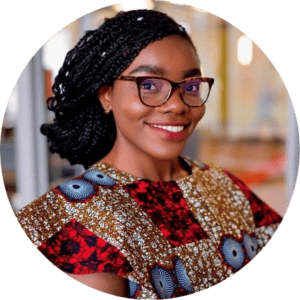
Some may recall that New Meridian issued a call for an assessment intern in the Spring. Now, summer is here—and so is the winning candidate.
Chioma Ezeh is a doctoral student at Washington State University in the Language, Literacy, and Technology program. Her research interests include teaching strategies that leverage linguistic and cultural practices that support students.
“I believe that everyone, whether that’s assessment companies or people in the classroom, must do what they can right now to make a change for cultural relevance in education. Classroom and state assessment practices go hand in hand and can really inform each other. If everyone is doing their part at their own level, it will contribute to changing the system as a whole.”
Chioma’s interest in the field was formed in the classroom studying teachers and how their instructional processes relate to their formative assessment practices. This interest coupled with a series of graduate classes on assessment drew her to this opportunity at New Meridian. During her 8-week internship, she worked with the assessment development and design team, researching new ways to build assessments that can serve all learners.
Collaboration Between Classroom and Assessment
As New Meridian continues working to make assessment more culturally relevant, Chioma outlined the common practices and possible challenges for both assessment vendors and educators. “I believe that everyone, whether that’s assessment companies or people in the classroom, must do what they can right now to make a change for cultural relevance in education,” she said. “Classroom and state assessment practices go hand in hand and can really inform each other. If everyone is doing their part at their own level, it will contribute to changing the system as a whole.”
Chioma spent time in classrooms studying how schools incorporate cultural and linguistic practices into their policies. She relates how these policies can benefit students as they develop foundational skills like interpreting meaning, which becomes increasingly difficult if what’s studied in the classroom doesn’t reflect the diversity of the student population. “Empowerment should start in the classroom,” she said. “Students need to see themselves in the curriculum and the literature so that outside of school they know how to construct their own ideas and form meaning from a given context.”
Leaning Into New Perspectives
She also describes the value of gaining different perspectives in the form of focus groups or interviews with people in the community who have first-hand experience with what’s happening in the classroom. “The more diverse perspectives we are able to garner during the development process, the better the assessment can reflect our student population,” she said. “The earlier we start collaborating on assessment with teachers and with the community, the better assessment will serve all learners.”
In addition to pursuing a doctorate and working with New Meridian this summer, Chioma is also a mother to two daughters. She says her research often influences her parenting.
“When I say things to my almost-four-year-old in my native language, I try to make her understand the part that meaning plays when learning something new in another language,” she said. “’Hello’ in English and ‘Ndewo’ in my native language, Igbo, have the same meaning because they are both greetings. We try to illustrate to her that we can find meaning using our past experiences and past knowledge to see that nothing is actually novel if you apply what you already know to a new situation.”


